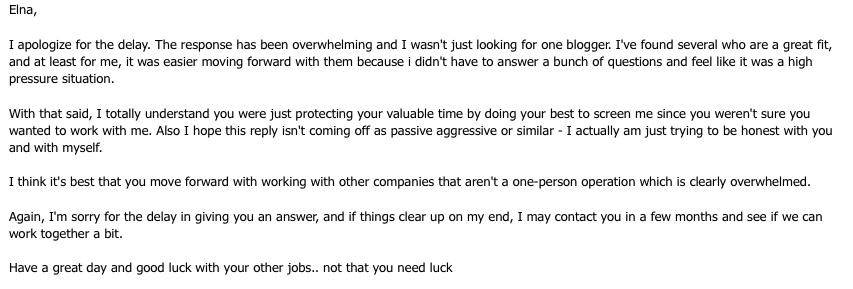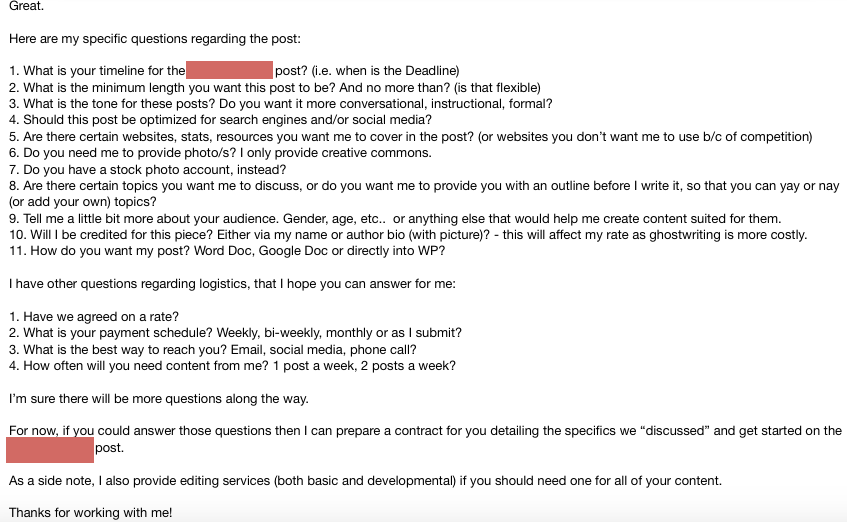It’s your first real break into freelance writing.
You’ve spent countless days, weeks and even months learning the ins and outs of getting paid to write.
Every spare minute is devoted to getting your little blogger butt ready for writing gigs.

From starting a blog and perfecting every post to being present on all the big social media platforms to having your own writer website – you are ready to open shop.
And then it finally happens – those guest posts you’ve been writing finally paid off. One of the blog owners wants to hire you for weekly content.
You’re ecstatic because this is your first paid writing gig and it’s with a popular blog that you already know and have written for.
You decide to give all your attention to this one client because after all, they are paying you and they want consistent content.
So, you stop pitching, no longer write posts for your own blog and even avoid updating your social media profiles.
Maybe your story is a little different.
Maybe you’ve been a freelance writer for a while now, and it’s going well. You only have one or two clients, but that’s okay because they require weekly content.
However, six months goes by and you haven’t sent out a pitch email. Next thing you know, one client decides to go a different way with their blog and you’re down a client.
You’re Killing Your Chance at a Freelance Writing Gig
If you don’t already know, freelance writing is a hustle game.
When you think you have enough clients and everything is running smoothly, something awful happens and half your clients let you go and you’re left scrambling to find more work.
When it’s good, you forget to keep up with marketing and promoting your content, pitching and updating your blog.
While this might hurt your chances at landing any new freelance writing gigs, keeping the ones you have or nurturing future prospects is equally important to do.
So, in an effort to help you not ruin your chance at landing your next big break, here are 3 ways you can kill your chance at a freelance writing gig before it even starts (I even provide real life examples).
1. You’re Too Pushy
You can’t help it, right?
You suddenly land your ideal client, and you’re ecstatic. You want to do everything possible to keep and retain this client.
But, you were too pushy and your gig went from 8 posts a months to 4 posts a month. Half your pay is gone and now you aren’t able to pay your bills.
How do you know if you’re too pushy?
One way is by asking too many questions.
It’s understandable – here’s a new client and you have a few questions to ask in order to understand their content needs.
After all, it’s up to us to represent our client’s voice and brand. That’s why they hired us, right?
Let’s look at a real life example. I pitched to a client and after reviewing my samples, he was interested in collaborating with me.
At this time, this would have been my third client. I was excited and wanted to make sure I had all the information I needed to make my blog posts reflect his brand (click on the email to read it).
Now, these weren’t all the questions I had. My email indicated I had even more questions than the 4 questions I asked.
On the same night, I emailed him this long list of questions:
Now, if you were a young lad with a brand new start up looking to hire a blogger or two, how would you approach this conversation? Would you run for the hills?
Unfortunately, all these questions squashed my chances at working with this awesome start up company.
I didn’t hear from him for a few days after I sent that email. So, I sent a follow up email and this is what he told me:
 This was a complete eye opener and I’m grateful for this person for giving me constructive feedback. I had no idea that my questions would be overwhelming. I figured businesses have worked with freelancers and know that questions will be asked.
This was a complete eye opener and I’m grateful for this person for giving me constructive feedback. I had no idea that my questions would be overwhelming. I figured businesses have worked with freelancers and know that questions will be asked.
But, because of this one incident, I no longer send emails with a million questions. I ask these questions when it’s relevant and only ask a few at a time.
2. You’re Presenting Yourself Like a “Know-It-All” (Rather Than Someone Who is Skilled at Their Job)
Don’t you hate people who tell you you’re wrong and they’re right?
It can be annoying and even frustrating.
They think they are helping you, but in all reality, you’re not listening to them and they start to dismiss what you are saying.
It’s the same with freelance writing clients. While it’s our job to know everything about SEO, lead geneartion, digital marketing, branding, blogger outreach, content marketing and all that information that’s in our industry, realize that many potential clients don’t have a clue what you’re talking about.
And if you present it in a way that is demeaning or patronizing, you could be rubbing your client the wrong way.
Let’s take a real life example. I noticed on a client’s blog that many of the writers failed to include internal links in their blog posts.
So, I thought maybe I could mention this to the client and at the same time upsell my services. This is what I ended up saying in my email:
By casually mentioning an issue and saying that you can fix it is a great way to show your client you are knowledgeable and can provide lots of services.
I could’ve written this such that it might appear as uncalled for advice.
No one likes to be called out on their faults.
The client agreed, but because of their budgeting costs they decided not to hire me for my editing services.

3. You’re Making Too Many Assumptions
Everyone knows what happens when you make assumptions, correct?
I learned early on in my freelance writing career that I sucked at communicating. For some reason, I made a lot of assumptions.
One of my earlier clients had me edit a piece and gave me a short deadline.
I knew this client was in a different country and calculated when the absolute latest time I could hand in the piece (I know now that it’s better to exceed deadlines than to wait till the last minute to turn in your work).
The deadline was “end of day Tuesday.”
I received an email from the client saying that I passed the deadline. I was confused because it was 7 a.m. on Tuesday morning. My email clearly indicated my frantic-ness.
 I obviously never worked with anyone outside North America, so my lack of experience clearly showed here.
I obviously never worked with anyone outside North America, so my lack of experience clearly showed here.
The client was very understanding and I quickly learned that when writing emails to clients, make sure:
- To be as clear as possible
- To itemize my concerns or questions
- To confirm any agreements made in previous correspondences
Freelance Writing Has a Learning Curve
When you begin your freelance writing journey, be prepared for multiple mistakes. Whether you fail to impress prospects with a pitch letter or your negotiation tactics are ineffective – learning the freelance writing ropes takes time.
I hope my real life examples will help any new freelance writers with navigating their road to success.
So, have you almost ruined a chance at a freelance writing gig? If so, tell me the story!







28 Comments